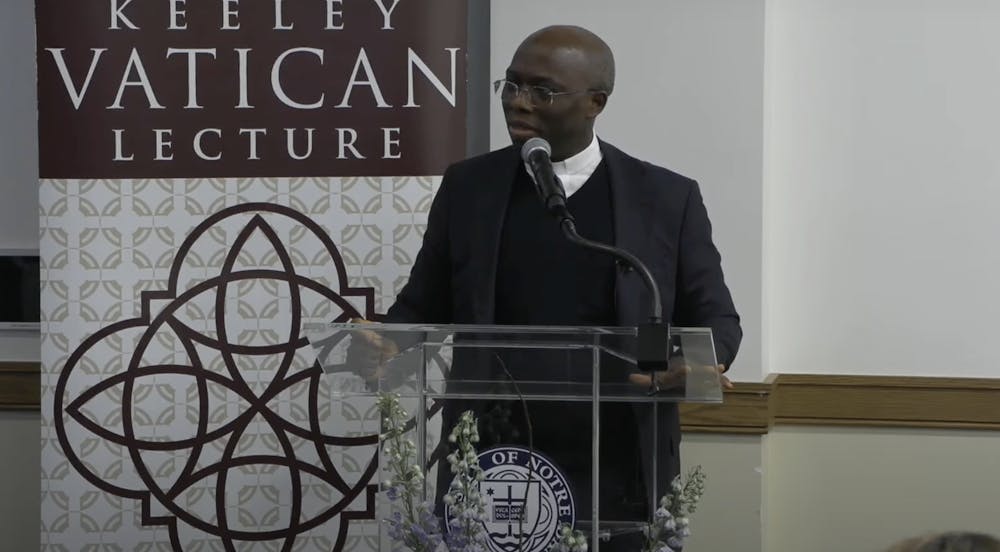Notre Dame’s annual Keeley Vatican lecture took place this Monday, featuring Reverend Monsignor Anthony Ekpo, undersecretary of the Dicastery for Promoting Integral Human Development. Hosted at Jenkins Nanovic Hall, the lecture aimed to strengthen Notre Dame’s connection with the Vatican by engaging in critical discussions on Catholic mission and global challenges.
This year’s lecture was centered on the reform of the Roman Curia and the Holy See’s commitment to integrated human development, a theme closely aligned with the focus of the Keough School of Global Affairs.
Ekpo’s address explored the progression of structural and theological reformations within the Vatican and their implications for the Roman Church’s engagement with the modern world. Ekpo, a Nigerian priest with doctorates in systematic theology and canon law, has played an essential role in the Vatican’s governance, particularly within the Dicastery for Promoting Integral Human Development.
The reverend began his lecture by acknowledging the historical complexities of the Roman Curia, noting both its strengths and the necessity for continued reform, to ensure adaptation to the evolving global landscape.
“The Roman Curia is always in need of reformation,” Ekpo said. “As it was in the beginning, is now and ever shall be … does not apply to Vatican structures.”
Tracing major reforms from Pope Sixtus V’s modernization to Pope Francis’ contemporary efforts, Ekpo detailed how the Curia has evolved to meet the needs of the church and the world.
He placed a particular emphasis on the most recent reforms implemented by Pope Francis, referencing Francis’ 2022 Apostolic Constitution “Praedicate Evangelium,” which introduced significant structural changes within the Curia, including the renaming of “congregations” as “dicasteries” to emphasize their equal importance in governance.
One of the most notable shifts under Pope Francis, Ekpo explained, is a renewed and humane focus on service and pastoral effectiveness.
“Reforming the Curia is not simply about organizational changes,” he said. “It is about renewing our commitment to justice, the common good and the dignity of every human person.”
A key component of Pope Francis’ reform has been the emphasis on integrated human development, which upholds human dignity as the foundation for social, economic and environmental well-being.
Ekpo described how the Dicastery for Promoting Integral Development plays a vital role in addressing the needs of the less fortunate.
“Our faith in Christ, who was always close to the poor and the outcast, is the basis of our concern for the integral development of all people,” Ekpo said. “It is not just about economic growth, but about the holistic flourishing of the human person.”
He then underscored the central goal of the dicastery.
“Our goal is to help the church to carry out its mission of serving the development of each person and of the whole person, of promoting life to the full for each and everyone, as Jesus said in the Gospel of John,” he said.
Ekpo also highlighted Notre Dame’s contribution to the mission, citing past collaborations between the University and the Vatican, including research initiatives and policy dialogues on global issues.
Ekpo advocated for Pope Francis’ vision of a church that is engaged with the realities of modern society rather than insulated from them. He emphasized the Pope’s belief in a humanized and accessible papacy, referencing Pope Francis’ comment on the first anniversary of his election.
“The Pope is neither a Superman nor a star, but an ordinary man who laughs and cries and sleeps calmly and has friends like everyone,” he said.
He praised the Pope's commitment to synodality — greater collaboration between clergy and laypeople — and his efforts to include women in high-ranking positions, highlighting the appointment of Sister Simona Brambilla as President of the Vatican City State.
“Pope Francis has humanized the papacy in new and refreshing ways,” Ekpo said, recounting anecdotes about the Pope’s humility and humor.
He noted that recent Vatican appointments reflect a shift toward inclusivity, where laypeople hold key leadership positions and hold considerable influence over the decisions being made.
“He humanizes the papacy and he has that very affable, simple, charming and disarming way of relating to and I think it goes back to our belief in Jesus being fully human and fully divine. Because in his being fully human, he sees the divinity of Christ.”
Ekpo concluded his lecture with a call to action, urging attendees to consider their role in advancing the church’s mission.
“Each of us is responsible for making our communities more just, compassionate and aligned with the Gospel,” he said. “Integral human development is not an abstract goal it is the very essence of what it means to be Christian.”
He furthered his stance by adding that, when moving towards Integral Human development, whether within the Curia or in society, one must always be rooted in Christ.
“Both the reformer and the reformed should know that it is not all about them. It is about Christ.”










